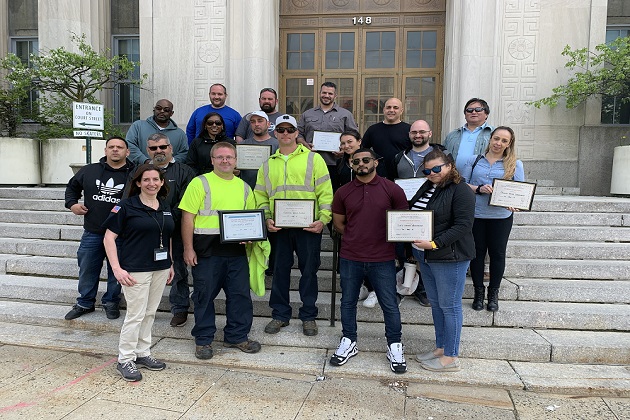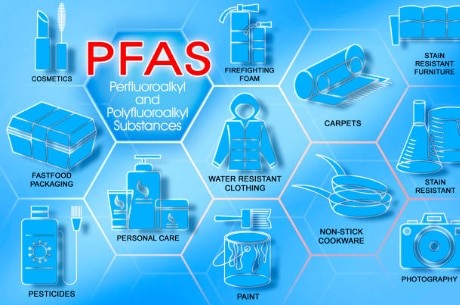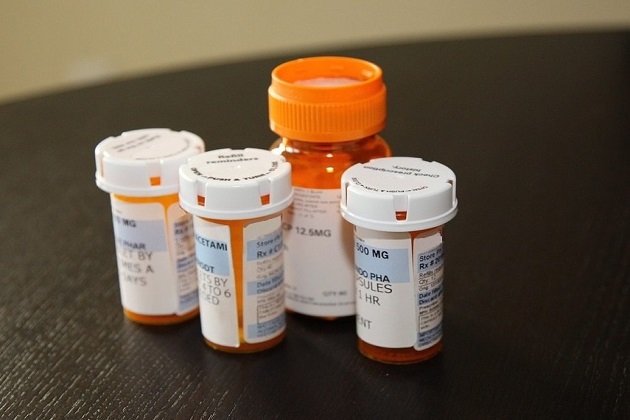
Westchester’s best-tasting water flows from faucets in Elmsford, according to an impartial panel of pedestrians who sipped their way through the Westchester County Department of Health’s annual water taste test today in White Plains.
One hundred thirteen people sampled water from 9 of the county’s public water suppliers on Martine Avenue in White Plains and then voted for their favorite without knowing where it was from. This friendly annual competition promotes the excellent quality of Westchester tap water, and highlights the role of the county health department in assuring drinking water quality.
“After drinking tap water from around the County today, I can tell you that Westchester water tastes great, and we shouldn’t take this natural resource for granted,” said County Executive George Latimer. “It’s reassuring to know we have professionals working behind the scenes to maintain and assure the high quality of our drinking water.”
The winner will advance to a regional competition, and the regional champion will compete for statewide bragging rights at the Great New York State Fair in Syracuse at the end of the summer.
The experts say a good glass of water should be clean, crisp, clear and cool. The county health department and the water suppliers sample the waters routinely to ensure all quality standards are met. All contest participants meet all water quality standards.
The nine water suppliers who competed were: Cortlandt Consolidated Water District; Elmsford Water District; Greenburgh Water District #1; Mount Vernon Water Department; Ossining Water Department; Peekskill Water Department; Suez Water Westchester, Inc.; White Plains Water Supply and Yonkers Water Supply.
In 1974, Congress first enacted the Safe Drinking Water Act to protect public health by regulating public water systems. The federal Environmental Protection Agency sets legal limits for more than 90 contaminants in public drinking water supplies. These limits, as well as water testing schedules and methods that water systems must follow, are enforced in Westchester by the County Health Department. Water systems must routinely sample their water and provide the results to the health department for review. Health Department engineers and sanitarians take their own samples to assure drinking water in Westchester meets all sanitary standards. In cases when the water doesn’t measure up, the health department assures that customers are notified, and that the water is treated or remediation takes place to bring the water up to regulatory standards. The health department also reviews and approves any construction or replacement of tanks, pipes and water mains within the systems.
Drinking Water 101
There are 100 community public water suppliers in Westchester County. If you have questions about your drinking water, you should contact your water supplier. To find out who your supplier is, use this interactive map.
Residents who would like to arrange testing to determine whether their own pipes or solder are leaching lead into their drinking water may contact their water supplier to ask whether the supplier will provide testing. If this is not available, residents can identify a certified commercial lab and arrange testing by using this NYSDOH search tool.
Westchester County Health Department regulates the quality of public drinking water. Each public water supplier routinely tests the drinking water and provides water test results reports for review by the health department. In addition, the health department regularly conducts spot checks of public water supplies and collects water samples for testing.
Recently you may have heard more about PFAS as being a contaminate found in drinking water supplies. For more information on this go to our PFAS information page.
When the water quality is compromised, the health department may issue a water use advisory. The most common water use advisory is a boil water alert issued for a water main break or other event. After corrective actions have been taken, the water pressure has been restored and satisfactory water sample test results are available for the affected area, the department alerts residents that the water is safe to drink.
Approximately 6% of Westchester County residents are served by private wells. In Westchester County, private wells must be tested upon the sale of the property, for leased property and prior to the use of water from new wells, in accordance with the Private Well Water Testing Law. The parameters tested include bacteria (total coliform); chloride; nitrate; pH; some heavy metals; and organics. Ongoing testing is required for leased property at least once every five years.
While not required by law, homeowners are advised to take special precautions to ensure the protection and maintenance of their drinking water supplies and to test their water periodically. The United States Environmental Protection Agency (USEPA) recommends that private water supplies be tested annually for nitrate and coliform bacteria to detect contamination problems early, or more frequently, if you suspect a problem. For more information, please visit the USEPA website.
Resources:
PFAS – What it Means, Why we Care and What you can Do

Understanding the Basics
Per- and Polyfluoroalkyl Substances (PFAS) are a group of chemicals used to make fluoropolymer coatings and products that resist heat, oil, stains, grease, and water. Fluoropolymer coatings are blends of resins and lubricants used in products such as water-repellent clothing, furniture, adhesives, paint and varnish, food packaging, heat-resistant non-stick cooking surfaces and insulation of electrical wires.
Chemicals in this group include perfluorooctanoic acid (PFOA) and perfluorooctane sulfonic acid (PFOS).
Some PFAS do not break down easily and persist for a long time in the environment, especially in water. Their toxicity and persistence in the environment mean they are a potential danger to public health and the environment. Additional information on potential health impacts can be found in the NYS Regulatory Impact Statement, DOH Fact Sheet and Reducing PFAS in Private Wells.
I am on a Public Water System – Does it have PFAS in it?
Public water systems in New York must monitor for more than 100 different contaminants on a regular schedule, including PFOA, PFOS and 1,4-dioxane. Public water systems must report on all PFAS included in the analytical method when they detect any level of PFOA and PFOS. This helps identify additional unregulated PFAS contaminants that may be present.
Water systems must notify their local health department of any exceedances above state and/or federal standards. If there is a confirmed exceedance, the public water system will work with their local health department to notify the public and develop a course of action and timetable to reduce to acceptable levels.
In addition, Public Water Systems must also do an Annual Water Quality Report. The Annual Water Quality Report is designed to provide consumers with information on the quality of the water delivered by their public water system. Annual Water Quality Reports must contain information about the water system; information on the source of the water; reporting levels of contaminants detected in the finished water; information on cryptosoridium, radon, and other unregulated contaminants; information on any violations of the national primary drinking water regulations; and information regarding any variances or exemptions the water system may be operating under. Many times, these Annual Water Quality Reports are located on a website for easy access.
I have my own well, does it have PFAS in it?
The Westchester County Department of Health does not monitor private wells that are used for single family homes.
If you want to have your water tested you should use a certified lab.
Certified Laboratory Testing
New York State Certified Laboratories that are credentialed with the NYS Environmental Laboratory Approval Program (ELAP) should be the type of lab to conduct your analysis. These laboratories comply with strict guidelines for analysis where their results meet required Quality Assurance and Quality Control measures.
Go to NYS ELAP see a list of certified laboratories.
What can I do if I have a private well and I have elevated PFAS levels?
Some residents have asked about the use of in-home drinking water filtration units for reducing the amount of perfluorinated chemicals (PFAS) in drinking water. Water filtration units that use granulated activated carbon (GAC, also called charcoal filters) and reverse osmosis (RO) can be effective in removing these chemicals from water.
If you are installing a residential water filter to decrease levels of PFAS in your drinking water, you should always follow the manufacturer recommendations for when the filter should be changed. These units range from relatively inexpensive filtered water pitchers to larger systems. Read more about in-home water filtration options for household drinking water.
 Are unused and expired drugs cluttering your cabinets? To help keep children, young adults and pets safer, bring your unwanted pills and liquid medicine to one of the many locations that accept them or to Westchester’s own Household Material Recovery Facility (H-MRF).
Are unused and expired drugs cluttering your cabinets? To help keep children, young adults and pets safer, bring your unwanted pills and liquid medicine to one of the many locations that accept them or to Westchester’s own Household Material Recovery Facility (H-MRF).
Westchester H-MRF
Westchester residents can make an appointment to bring drugs in their original container or a sealed plastic bag to the county Household Material Recovery Facility, 15 Woods Road in Valhalla. Medications are only accepted on designated days. When booking an appointment, you will select your zip code and then be able to view the calendar of available days, including designated med take-back days. You can also call the Recycling HelpLine at (914) 813-5425 for more information or to make an appointment.
Safe Medication Disposal Information
-
Improper disposal
Never dispose of medications by flushing them down the drain or toilet. Doing so can taint local waterways and cause harm to those ecosystems. It is important to only flush toilet paper and human waste down the toilet.Proper disposal
Medications may be brought to a participating police department for collection. - You can also drop off your unused/expired medications at these pharmacies with medication lock boxes:
- Circle Pharmacy , 120 Gramatan Ave., Mount Vernon, NY 10550
- Walgreens, 1230 Nepperhan Ave., Yonkers, NY 10703
- Grassy Sprain Pharmacy, 640 Tuckahoe Road, Yonkers, NY 10710
- Grassy Sprain Longterm Care, 1567 Central Park Avenue, Yonkers, NY 10710
- Lemac Pharmacy, 623 Mclean Avenue, Yonkers, NY 10705
- Taconic Pharmacy, 3659 Lee Road, Jefferson Valley, NY 10535
- Trotta's West Street Pharmacy, 15 Halstead Avenue, Harrison, NY 10528 -
As a last resort, prescription or over-the-counter pills, liquids, ointments, and lotions as well as pet medications can be disposed with household garbage according to the proper protocol laid out by the New York State Department of Conservation:
- Mix medications (do not crush tablets or capsules) with water and then add salt, ashes, dirt, cat litter, coffee grounds, or another undesirable substance, to avoid accidental or intentional misuse of drugs. To prevent unintentional consumption by scavenging humans, pets, or wildlife, do not conceal discarded drugs in food.
- Hide all medications in an outer container, such as sealable bag, box or plastic tub to prevent discovery and removal from the trash. Seal the container with strong tape.
- Dispose of drugs as close to your trash collection day as possible to avoid misuse and/or misdirection.
For more information visit the NYS DEC Safe Medication Disposal for Households page
Sharp Smarts
Many people use sharps (needles, syringes and lancets) as part of their home medical care. Proper disposal of sharps is important to the safety of the sharps user and to workers who handle trash. Follow the guidelines in the Sharps Smart brochure to keep yourself and others safe.
The Westchester County Private Well Water Testing Legislation , Local Law 7 of 2007, was duly adopted on May 23, 2007, and became effective Nov. 19, 2007.
- Summary of the Private Well Water Testing Law
- Private Well Water Testing Law
- Rules and Regulations for private well water testing in Westchester County
- Questions and Answers about the Private Well Water Testing Law
- Updated May 2015 - List of New York State Certified Laboratories registered with the Westchester County Department of Health to submit all required water test results and other required information. (pursuant to the Private Well Water Testing Law, Chapter 707 of the Laws of Westchester County).
Resources
- Private Drinking Water Well (EPA)
- About Drinking Water (CDC)
For more information, call (914) 864-7360
Environmental health inspectors respond to septic system overflows and sewage spills to prevent the contamination of bathing beaches, water bodies and well water. Drinking water quality is ensured through expanded monitoring and sampling of county water supplies.
Environmental engineers regularly monitor water and sewage treatment plants to improve and maintain healthful and safe drinking and bathing water quality and to prevent and control water pollution.
Environmental engineers maintained a leadership role in negotiations with New York City about watershed protection. Representatives from Westchester County government worked to help bring about effective regulation to protect the NYC water supply system which also serves 85 percent of Westchester's water needs.
Public Water Supply Protection Forms
- Application for Approval of Plans for Public Water Supply Improvements (DOH-348)
- Application for Approval of Backflow Prevention Devices (DOH-347)
- Report on Test and Maintenance of Backflow Prevention Device(DOH-1013)
- Instructions for completing form DOH-1013
Resources
Guidelines for plan submissions:
See also backflow prevention.
